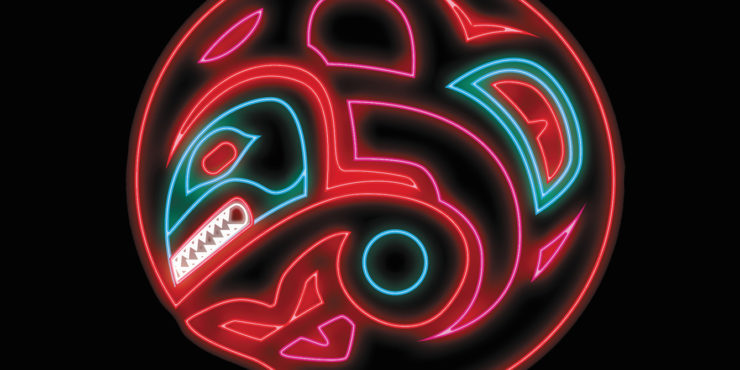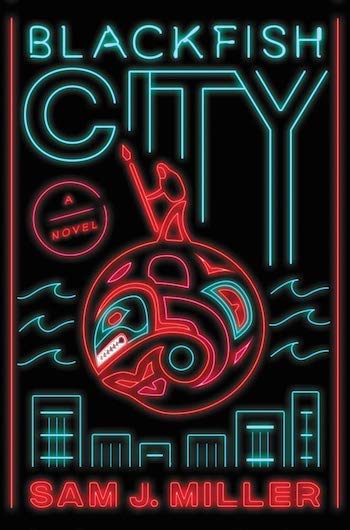When a strange new visitor arrives—a woman riding an orca, with a polar bear at her side—the city is entranced. The “orcamancer,” as she’s known, brings together four people—each living on the periphery—to stage unprecedented acts of resistance. By banding together to save their city before it crumbles under the weight of its own decay, they will learn shocking truths about themselves.
A 2018 Nebula Awards finalist for Best Novel, Sam J. Miller’s Blackfish City is a remarkably urgent—and ultimately very hopeful—novel about political corruption, organized crime, technology run amok, the consequences of climate change, gender identity, and the unifying power of human connection. Please enjoy this deleted scene from the novel, below:
Blackfish City
Most peopled places turn the sea sour, foul, toxic. You can smell them from a day’s swim away, the filth they put in the water. The stink of their suffering.
This place is not so bad. They have huge machines for processing their waste. The cold keeps them out of the sea. A giant metal cone warms the deep water. We’ve been to seventy-three peopled places, and I think I like this one best. Which isn’t to say I actually like it.
She thinks this will be the last. I hope she is right. I hope we can do what we came here to do and then go back to someplace unpeopled. In peopled places she has to keep the bear chained up, keep him out of the water. This makes him angry, uncontrollable. He is my only friend, but I am afraid for her when they are up on the surface where I cannot help her if something goes wrong.
Their eyes find me, no matter how deep I dive. Tiny machines that see in the dark. Connected to people up above. They summon other machines, who watch me too. Follow me everywhere I go. These machines do not try to hurt me, at least. That hasn’t been true everywhere we’ve gone. People watch her, too, up above. I feel their eyes on her.
When we returned home, all those years ago, and found our people slaughtered, she wept for a full day. I wailed with her, for my own murdered kin and for hers. Each of us amplified the other’s pain, echoed it back and forth, until I thought it would split us in two. Only hunger saved us. Hunger stirred my savagery, which roused her own, which stopped our wailing.
She brought me armfuls of bloody snow, hacked-off pieces, shreds of clothing. I could tell them apart, our people and the people who hurt them. I smelled their bodies, their sweat, their hair, their waste, their stories. From their smells I could see their shape, their weight, whether they were young or old or weak or strong.
Forty people, total. I could see their outlines, so so could she. And so we moved on. Looking for our lost, the ones whose bodies we did not find, who we know escaped—and looking for those forty outlines.
We found many of them. In the cities of the land and the cities of the sea. Sooner or later, if they were there to be found, I would catch their scent. She broke them apart or she pushed them into the sea for me to tear to slow tiny pieces. Some we learned things from. The names and locations of their comrades. Others had nothing to offer, but their fate was the same.
I yearn for the open sea, the unpeopled places. And so, so does she.
There are none of my kind, swimming in the sea surrounding this peopled place. Not here, not anywhere close. They have abandoned these waters. They were hunted, here, cleared out for food, our babies taken, and the warnings still hang in the water like oil. I’m not sad about it, anymore, when we arrive in some new place and I am still alone. She feels the same thing. Lonely is not like sad. When we mirror each other’s loneliness it grows smaller, not larger.
Buy the Book


Blackfish City
Originally published February 2019.











